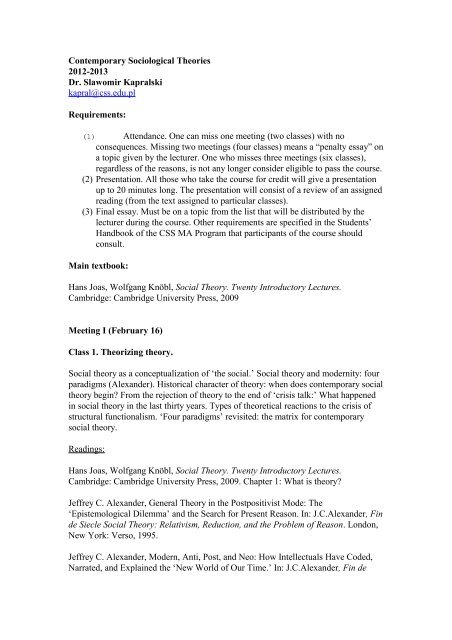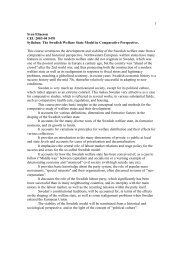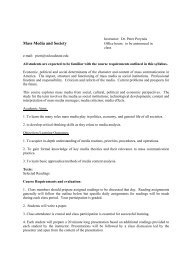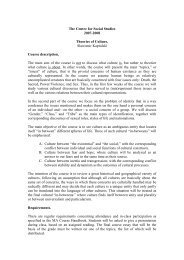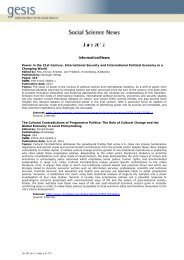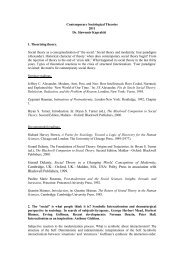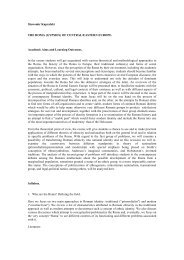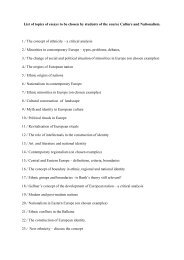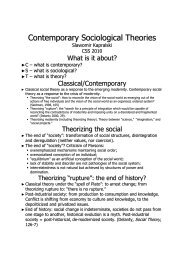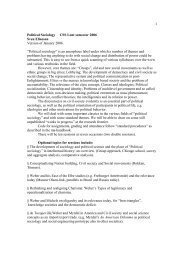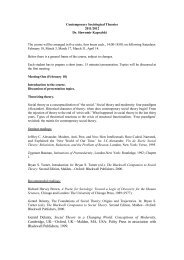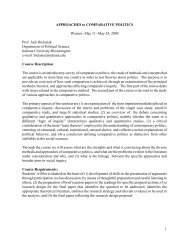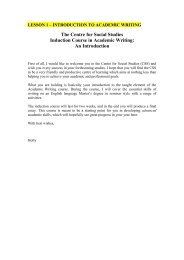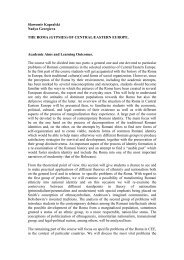Contemporary Social Theory
Contemporary Social Theory
Contemporary Social Theory
You also want an ePaper? Increase the reach of your titles
YUMPU automatically turns print PDFs into web optimized ePapers that Google loves.
<strong>Contemporary</strong> Sociological Theories2012-2013Dr. Slawomir Kapralskikapral@css.edu.plRequirements:(1) Attendance. One can miss one meeting (two classes) with noconsequences. Missing two meetings (four classes) means a “penalty essay” ona topic given by the lecturer. One who misses three meetings (six classes),regardless of the reasons, is not any longer consider eligible to pass the course.(2) Presentation. All those who take the course for credit will give a presentationup to 20 minutes long. The presentation will consist of a review of an assignedreading (from the text assigned to particular classes).(3) Final essay. Must be on a topic from the list that will be distributed by thelecturer during the course. Other requirements are specified in the Students’Handbook of the CSS MA Program that participants of the course shouldconsult.Main textbook:Hans Joas, Wolfgang Knöbl, <strong>Social</strong> <strong>Theory</strong>. Twenty Introductory Lectures.Cambridge: Cambridge University Press, 2009Meeting I (February 16)Class 1. Theorizing theory.<strong>Social</strong> theory as a conceptualization of ‘the social.’ <strong>Social</strong> theory and modernity: fourparadigms (Alexander). Historical character of theory: when does contemporary socialtheory begin? From the rejection of theory to the end of ‘crisis talk:’ What happenedin social theory in the last thirty years. Types of theoretical reactions to the crisis ofstructural functionalism. ‘Four paradigms’ revisited: the matrix for contemporarysocial theory.Readings:Hans Joas, Wolfgang Knöbl, <strong>Social</strong> <strong>Theory</strong>. Twenty Introductory Lectures.Cambridge: Cambridge University Press, 2009. Chapter 1: What is theory?Jeffrey C. Alexander, General <strong>Theory</strong> in the Postpositivist Mode: The‘Epistemological Dilemma’ and the Search for Present Reason. In: J.C.Alexander, Finde Siecle <strong>Social</strong> <strong>Theory</strong>: Relativism, Reduction, and the Problem of Reason. London,New York: Verso, 1995.Jeffrey C. Alexander, Modern, Anti, Post, and Neo: How Intellectuals Have Coded,Narrated, and Explained the ‘New World of Our Time.’ In: J.C.Alexander, Fin de
Siecle <strong>Social</strong> <strong>Theory</strong>: Relativism, Reduction, and the Problem of Reason, London,New York: Verso, 1995.Class 2. The “social” is what people think it is?Symbolic Interactionism and dramaturgical perspective in sociology. In search ofsubjectivity/agency. The social world as emerging out of human interactions: HerbertBlumer. The “Blumer dilemma”: “situation” between “action” and “structure/culture.”Out of dilemma: Erving Goffman and the interaction order. Recent developments:twards macrosociological interactionism -Norman Denzin, Peter Hall. Denzin’sinterpretive interactionism. Interactionism as an inspiration in Anthony Giddens’theoretical syncretism.Readings:Hans Joas, Wolfgang Knöbl, <strong>Social</strong> <strong>Theory</strong>. Twenty Introductory Lectures.Cambridge: Cambridge University Press, 2009. Chapter 6: Interpretive approaches(1): symbolic interactionism.Peter M. Hall, A Symbolic Interactionist Analysis of Politics. In: K.Plummer (ed.),Symbolic Interactionism, Vol. II: <strong>Contemporary</strong> Issues, Aldershot: Edward Elgar (AnElgar Reference Collection), 1991.Meeting II (March 2)Class 3. Phenomenological inspiration and Ethnomethodology.Phenomenology as ‘de-socialization’ and ‘re-socialization.’ Alfred Schutz: life-world,natural attitude, and social theory as a theory of knowledge. Ethnomethodologicalfield of studies. Reflexive character of daily life: ‘account-ability’ of activities.Ethnomethodology as a foundational challenge for sociology. ‘Presupposed order’: onobjective reality of subjective perceptions.Readings:Hans Joas, Wolfgang Knöbl, <strong>Social</strong> <strong>Theory</strong>. Twenty Introductory Lectures.Cambridge: Cambridge University Press, 2009. Chapter 7: Interpretative approaches(2): ethnomethodology.Steven Vaitkus, Phenomenology and Sociology. In: Bryan S. Turner (ed.), TheBlackwell Companion to <strong>Social</strong> <strong>Theory</strong>. Second Edition. Malden, Massachusetts,USA and Oxford, UK: Blackwell Publishers, 2000.Hans Joas, Wolfgang Knöbl, <strong>Social</strong> <strong>Theory</strong>. Twenty Introductory Lectures.Cambridge: Cambridge University Press, 2009. Chapter 5: Neo-utilitarianism.
Class 4. The “social” is not what people think it is? Transformations of therevolutionary spirit: in search of the lost utopia? Jürgen Habermas and Critical<strong>Theory</strong>.The contribution of Frankfurt School. Habermas' project: a theory with a practicalintention. From a diagnosis of capitalist society to the theory of knowledge andcognitive interests. Types of action and rationality. Critical theory as a critique ofdistorted communication. System—Lifeworld relation. Modernity as an unfinishedproject. Habermas—Lyotard debate.Readings:Hans Joas, Wolfgang Knöbl, <strong>Social</strong> <strong>Theory</strong>. Twenty Introductory Lectures.Cambridge: Cambridge University Press, 2009. Chapter 9: Habermas and criticaltheory. Chapter 10: Habermas’ ‘theory of communicative action’.Meeting III (March 16)Class 5. New developments in Critical <strong>Theory</strong>.Critical theory and contemporary world: “emancipation in the age of global socialmovements.” Feminism and critical theory. Politics of identity, politics of difference,politics of recognition.Readings:Hans Joas, Wolfgang Knöbl, <strong>Social</strong> <strong>Theory</strong>. Twenty Introductory Lectures.Cambridge: Cambridge University Press, 2009. Chapter 17: Feminist social theories.Craig Calhoun, Critical <strong>Social</strong> <strong>Theory</strong>. Oxford UK & Cambridge USA: Blackwell1995. Chapters 6 and 7.Mauro Basaure, Continuity through rupture with the Frankfurt school: AxelHonneth’s theory of recognition. In: G. Delanty, S.P. Turner (eds.) RoutledgeInternational Handbook of <strong>Contemporary</strong> <strong>Social</strong> and Political <strong>Theory</strong>. Oxon:Routledge, 2011.Clare Colebrook, Feminist social and political theory. In: G. Delanty, S.P. Turner(eds.) Routledge International Handbook of <strong>Contemporary</strong> <strong>Social</strong> and Political<strong>Theory</strong>. Oxon: Routledge, 2011.Classs 6. The “social” is what it is? From Functionalism to Neofunctionalism.Jeffrey Alexander, Paul Colomy. The “German Branch:” Niklas Luhmann,Richard Munch.Post-Parsonian period in sociology. Fields of reconstruction and continuation (action,order, equilibrium, ideology). Neofunctionalist research programs in sociology of
culture (Alexander) and in sociology of social change (Colomy). Luhmann: types ofsystems and their modes of reproduction; temporality of social systems;communication as an elementary unit of sociological analysis. Richard Munch:structure—action dilemma. General theory of action: symbolic complexity and actioncontingency.Readings:Hans Joas, Wolfgang Knöbl, <strong>Social</strong> <strong>Theory</strong>. Twenty Introductory Lectures.Cambridge: Cambridge University Press, 2009. Chapter 13: The renewal ofParsonianism and modernization theory.Hans Joas, Wolfgang Knöbl, <strong>Social</strong> <strong>Theory</strong>. Twenty Introductory Lectures.Cambridge: Cambridge University Press, 2009. Chapter 11: Niklas Luhmann’sradicalization of functionalism.Richard Münch, Sociological <strong>Theory</strong>. Vol. 3: Development Since the 1960s.Chicago: Nelson-Hall Publishers, 1994. Chapter 16: Communication as SystemicInformation Processing: Niklas Luhmann’s Systems <strong>Theory</strong>.Jeffrey C. Alexander, General <strong>Theory</strong> in the Postpositivist Mode: The‘Epistemological Dilemma’ and the Search for Present Reason. In: J.C.Alexander, Finde Siecle <strong>Social</strong> <strong>Theory</strong>: Relativism, Reduction, and the Problem of Reason. London,New York: Verso, 1995.Meeting IV (March 30)Class 7. There is no “social”? Postmodernism and social theory.Postmodernism as a way out, as an attitude, as a transition. Postmodernism andmodernity. Postmodernism and ambivalence. Deconstructing narratives in the era ofsimulation (Derrida—Lyotard—Baudrillard). Postmodern conceptions of socialsciences: discontinuity and dissemination. Postmodern deconstruction of “society”:the end of agency, the end of resistance, the end of history.Readings:Hans Joas, Wolfgang Knöbl, <strong>Social</strong> <strong>Theory</strong>. Twenty Introductory Lectures.Cambridge: Cambridge University Press, 2009. Chapter 14: Structuralism andpoststructuralism.Richard Münch, Sociological <strong>Theory</strong>. Vol. 3: Development Since the 1960s.Chicago: Nelson-Hall Publishers, 1994. Chapter 1: The <strong>Social</strong> and Cultural World asa Structure: Claude Lévi-Strauss and the Development from Structuralism to Post-Structuralism and Postmodernism; Chapter 2: The Reproduction of Power Structures:The Post-Structuralism of Michel Foucault.
Zygmunt Bauman, Modernity and Ambivalence, Cambridge: Polity Press, 1991.Chapter 1, Chapter 2, Chapter 7.Barry Smart, Postmodern <strong>Social</strong> <strong>Theory</strong>. In: Bryan S. Turner (ed.), The BlackwellCompanion to <strong>Social</strong> <strong>Theory</strong>. Second Edition. Malden, Massachusetts, USA andOxford, UK: Blackwell Publishers, 2000.Class 8. The return of history in social theory.Does history come to an end? Historicity and conceptualization of change inpostmodern debate and beyond. The problem of technology and the new world order:Derrida, Fukuyama, Jameson, Latour. Towards reflexive modernization? Beck and therisk society. Giddens and the reflexivity of late modernity.Readings:Craig Calhoun, Critical <strong>Social</strong> <strong>Theory</strong>, Oxford, UK, Cambridge, USA: Blackwell,1995: Chapter 4: Postmodernism as Pseudohistory: The Trivialization of EpochalChange.Gerard Delanty, <strong>Social</strong> <strong>Theory</strong> in a Changing World. Cambridge: Polity Press 1999.Chapter 6.Hans Joas, Wolfgang Knöbl, <strong>Social</strong> <strong>Theory</strong>. Twenty Introductory Lectures.Cambridge: Cambridge University Press, 2009. Chapter 18: A crisis of modernity?New diagnoses.Peter Wagner, Modernity: From convergence and stability to plurality andtransformation. In: G. Delanty, S.P. Turner (eds.) Routledge International Handbookof <strong>Contemporary</strong> <strong>Social</strong> and Political <strong>Theory</strong>. Oxon: Routledge, 2011.Amelia Arsenault, Networks: The technological and the social. In: G. Delanty, S.P.Turner (eds.) Routledge International Handbook of <strong>Contemporary</strong> <strong>Social</strong> andPolitical <strong>Theory</strong>. Oxon: Routledge, 2011.Meeting V (April 13)Class 9. The return of the “social.”Evolution of the postmodernist debate: from deconstruction to social constructivism?Is society more than a “text”? “<strong>Social</strong> postmodernism:” Bauman and the ethicalcomponents of social life. Touraine: the return of social agency. Luhmann: society asthe (im)possibility of communication. Bourdieu: self-perpetuation of society throughculture.Readings:
William H. Sewell Jr., Logics of History. <strong>Social</strong> <strong>Theory</strong> and <strong>Social</strong> Transformation.Chicago and London: The University of Chicago Press, 2005. Chapter 10: Refiguringthe “<strong>Social</strong>” in <strong>Social</strong> Science: An Interpretivist Manifesto.Hans Joas, Wolfgang Knöbl, <strong>Social</strong> <strong>Theory</strong>. Twenty Introductory Lectures.Cambridge: Cambridge University Press, 2009. Chapter 15: Between structuralismand theory of practice. The cultural sociology of Pierre Bourdieu.Hans Joas, Wolfgang Knöbl, <strong>Social</strong> <strong>Theory</strong>. Twenty Introductory Lectures.Cambridge: Cambridge University Press, 2009. Chapter 16: French anti-structuralists(Cornelius Castoriadis, Alain Touraine and Paul Ricoeur).Richard Münch, Sociological <strong>Theory</strong>. Vol. 3: Development Since the 1960s.Chicago: Nelson-Hall Publishers, 1994. Chapter 9: Action, Movement, and the Self-Production of Society: Alain Touraine’s <strong>Theory</strong> of <strong>Social</strong> Movements.Gerard Delanty, <strong>Social</strong> <strong>Theory</strong> in a Changing World. Cambridge: Polity Press 1999.Chapters 4 and 5.Class 10. Culture, identity, and globalization.Towards a theoretical approach to culture in contemporary sociology. Culture andidentity. Castells: network society and identities of resistance. Appadurai: ethnoscapesand deterritorialization of identity. Bauman: liquid modernity and fragmentation ofidentities. Bhabha: postcolonial theory and hybridization of identities. Outhwaite andRay: convergence and postcommunism.Readings:Hans Joas, Wolfgang Knöbl, <strong>Social</strong> <strong>Theory</strong>. Twenty Introductory Lectures.Cambridge: Cambridge University Press, 2009. Chapter 20: How things stand.William Outhwaite and Larry Ray, <strong>Social</strong> <strong>Theory</strong> and Postcommunism. Malden, MA,USA, Oxford, UK, and Carlton, Australia: Blackwell Publishing, 2005.Zygmunt Bauman, From Pilgrim to Tourist - or a Short History of Identity. In: StuartHall and Paul du Gay (eds.) Questions of Cultural Identity. London: Sage, 1996.Plus a selection from:Arjun Appadurai, Modernity at Large. Cultural Dimensions of Globalization.Minneapolis and London: University of Minnesota Press, 1996.Zygmunt Bauman, Life in Fragments: Essays in Postmodern Morality. Oxford:Blackwell, 1995.Homi K. Bhabha, The Location of Culture. London and New York: Routledge, 1994.
Manuel Castells, The Information Age. Economy, Society and Culture. Volume II:The Power of Identity. Malden, Massachusetts and Oxford, UK: Blackwell, 1997.


